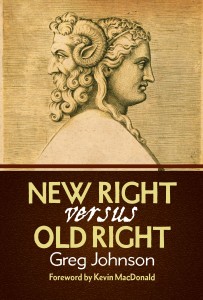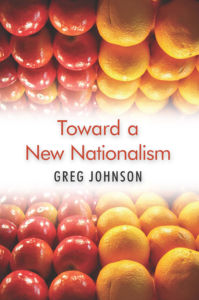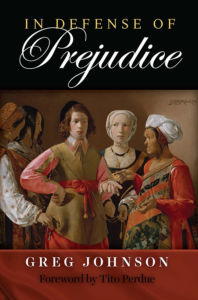The Vices of The Virtue of Nationalism
Hazony on Ethnic vs. Civic Nationalism
Posted By
Greg Johnson
On
In
North American New Right
| Comments Disabled
2,530 words
In my review [2] of Yoram Hazony’s The Virtue of Nationalism, I focused on the book’s virtues. Here I wish to examine some of its vices.
The positions I defend in The White Nationalist Manifesto [3] (San Francisco: Counter-Currents, 2018) are broadly compatible with the main arguments of The Virtue of Nationalism. We both hold that nations are ethnic groups and that the best political system is the nation-state, because it promotes peace between peoples and leaves them free to become who they are, to live according to their unique identities. We also hold that empires—including high-minded liberal globalist schemes to create universal peace and prosperity—lead to conflict, hatred, despotism, and the destruction of diversity.
There are three main points on which Hazony and I diverge. First, he thinks shared kinship is less important than shared ideas in defining a nation, which makes it hard for him to distinguish ethnic from civic nationalism. Second, he is dismissive of the idea of complete ethnic homogeneity in a nation-state, which makes his account of the nation-state hard to differentiate from an empire. Third, he denies that there is a universal right to the self-determination of peoples.
Kinship & Conventions
 [4]
[4]You can buy Greg Johnson’s The White Nationalist Manifesto here [3]
Hazony recognizes that individuals come into the world as members of collectives: families, clans, tribes, and nations. Specifically, individuals are born into these groups. They are all kinship groups. The family is our primary kinship group, but clans, tribes, and nations are progressively more extended families. Kinship is, of course, a biological category. But Hazony makes a puzzling claim:
It is important to notice that the Israelites’ conception of the nation has nothing to do with biology or what we call race. For biblical nations, everything depends on a shared understanding of history, language, and religion that is passed from parents to children, but which outsiders can join as well. . . . But the ability of Israel to bring these foreign-born individuals into its ranks depends on their willingness to accept Israel’s God, laws, and understanding of history. Without embracing these central aspects of Israelite tradition, they will not become a part of the Israelite nation. (p. 20)
Later, he adds:
The mutual loyalty of individuals to one another is the most powerful force operative in the political realm. . . . Modern writers, who have been too much influenced by Darwinian science, tend to look for ways of explaining this as a process driven by biological kinship. But this has never been so. An isolated human individual, having survived a war or disease that has cut him off from his family and his clan, will invariably attach himself to a new family or a new clan, adding his strength to theirs and receiving their protection in turn. In so doing, he establishes new bonds of mutual loyalty to replace those that had been lost, and this without any necessary tie of biological kinship. This constant regeneration of shattered bonds of mutual loyalty means that families can and do adopt individual members that were not born among them, and that clans adopt entire families that were not born among them. In the same way, nations adopt not only foreign individuals and families, but entire tribes that were once foreigners but are no considered foreigners any longer.
Thus while all nations use the metaphor of brotherhood to invoke a family-like relationship of mutual loyalty among their members, actual biological kinship is never more than a raw material upon which a nation is built, if it is even that. In the end, the decisive factor is the ties of mutual loyalty that have been established among members of a nation in the face of long years of joint hardship and success. (pp. 69–70)
First of all, it seems an overstatement to claim that nationhood has “nothing to do with” kinship simply because people who were not born into a nation can become part of one. That is like saying that families have “nothing to do with” kinship because one’s spouse is not born into one’s family. Marriages are established and governed according to conventions, but does this mean that the family is entirely a matter of convention, and that biology has “nothing to do with” it? Obviously not.
 [5]
[5]You can buy Greg Johnson’s New Right vs. Old Right here [6]
Families are biological enterprises, meaning they begin as biological entities and seek to perpetuate themselves as biological entities. People are born into families, and spouses are brought into families to propagate them biologically into the future. Two families are united by convention in marriage, but they become united by nature when children are born that carry on both bloodlines.
Families can adopt children, of course, but it is a legal fiction. In adoption, parents act as if they are biological parents; children act as if they are biological children. But both parents and children feel a distance that they do not feel with biological kin. Every adoptive child knows this immediately when he meets his biological parents or siblings. Blood is thicker than convention. This is why twins who are separated at birth are more similar to one another than to any adoptive siblings.
It should also be noted that orphans can receive the same essential care without the fictions of adoption simply by becoming wards of other families, for instance when an orphan is taken in by his godparents.
As for “adoption” into clans, tribes, and nations: these are biological enterprises as well. People are born into them, and others are brought into them to help propagate them into the future. This process is, revealingly, called “naturalization.” Naturalization is governed by convention, but a new member of one’s tribe or nation becomes truly naturalized when he or she marries among the natives and blends their bloodlines together.
In The White Nationalist Manifesto, I draw upon Genetic Similarity Theory, which argues that social harmony is a function of genetic similarity (see pp. 83–86). Thus biologically homogeneous nations are happier than biologically heterogeneous ones. People do not marry members of their own families, of course, and nations can “naturalize” outsiders, but the happiest marriages and the best candidates for naturalization are genetically similar to the kinship groups they are joining. Biological similarity explains why it is more common for spouses to kill one another than their own children (one is not a close blood relative with one’s spouse). It also explains why step-parents are notorious for abuse and neglect.
 [7]
[7]You can buy Greg Johnson’s Toward a New Nationalism here [8]
Biological race comes into play because races are the widest category of genetically compatible candidates for marriage or naturalization. It is bad to marry members of other races, for the genetic distance between you and your spouse will create an unstable relationship, your children will be more biologically alien to you than any random stranger of your own race, and the unique biological traits of your race—especially the genetically recessive ones—will not be passed on to your offspring. And if it is bad to marry members of other races, then one should not naturalize them as part of one’s nation, because every candidate for naturalization should be considered as a potential daughter- or son-in-law.
Families, clans, tribes, and nations are not entirely biological categories. They are also defined in terms of conventions. To this extent, Hazony is correct to say that they are not entirely biological. But the conventions are generally subordinated to the fact that these collectives are all biological enterprises, with biological origins and aims. Thus Hazony is guilty of a gross exaggeration when he says that they have “nothing to do with biology or what we call race.” They have almost everything to do with biological kinship, including race.
Hazony’s position is complicated by the fact that he is an orthodox Jew, who holds that the Jewish nation was constituted by receiving the Ten Commandments at Sinai, and that other individuals and tribes can become Jews by accepting the Jewish religion, as well as their language and customs. It is this “constructivist” idea that different peoples can be made into Jews or members of other nations by imposing ideas upon them that leads to Hazony’s statement that “biological kinship is never more than a raw material upon which a nation is built, if it is even that.” For an ideologue, ideas are the form and people are merely the matter of society.
Let’s bracket for now the question of whether any of the Bible’s historical narratives are true. On Hazony’s own terms, it is a mistake to identify the Jewish people with the Jewish religion, because the Jews existed as a people before the exodus and the legislation of Sinai. Beyond that, the vast majority of Jews today no longer believe in the Jewish religion, including Hazony’s fellow Israelis, but they somehow remain Jews. To my eyes, the Jewish religion is just a phase that the Jewish people went through in their long history.
Hazony is correct that the ancient Israelites naturalized some Egyptians, Midianites, and Moabites and made them part of their nation. (Of course, biologically speaking, these groups were not all that different to start with.) But to claim that what is essential to Jewish nationhood is ideas, not kinship, commits him to the absurdity that if the seed of Abraham became biologically extinct, Jews would still exist as long as some Ethiopians thought of themselves as Jews. And if the Palestinians want their land back, I suppose that all they need do is convert to Judaism and invoke their right of return.
 [9]
[9]You can buy Greg Johnson’s From Plato to Postmodernism here [10]
If ideas are essential and biological kinship is at best the “raw material” of nationhood, one is committed to the idea that a nation can continue even if its people have been replaced. I submit that no political philosophy or political regime is legitimate if it in effect declares to a people: “If you accept our rule, we can’t guarantee that you, the people, will not be replaced by an entirely alien people. But what counts is the perpetuation of our ideas, not your particular bloodlines. You are merely the ‘raw material’ for the projects of us ideologues and politicians.” Try it, but be aware that a sensible people might hand you your head.
Hazony’s conception of Jewish nationhood as essentially a matter of religion is indistinguishable from the civic nationalist ideas he critiques elsewhere in The Virtue of Nationalism in Chapter XVI, “The Myth of the Neutral State.”
The neutral state is the idea that since every nation-state inevitably contains some minorities, in fairness to minorities, every state should strive to be culturally neutral and to replace the cohesion of a core ethnic group with a universal civic ideology. Hazony dismisses the idea that a nation can be unified by an ideology rather than by a core ethnic group:
The neutral state is a myth. It is invoked time and again by those who imagine that the state can exist in the absence of national or tribal cohesion—when in reality it is only national or tribal cohesion that permits an independent state to be established and maintained without unceasing political repressions. (p. 156)
If it is not loyalty to the tribe or nation that moves the individual to shoulder such onerous burdens [obeying the law, paying taxes, and serving in the military], what will be the source of his motivations to make such sacrifices in the neutral states? Recognizing that some such motivation is needed, advocates of the neutral state propose that individuals should be loyal to the constitutional documents of the state, and to its various symbols that the officials of the state have invented to represent these constitutional documents in the minds of the population. (pp. 156–57)
Hazony even claims that founding documents that cannot be sufficient sources of social cohesion include sacred books like the Hebrew bible:
We do know of instances of what seems to be such loyalty to a written document. Throughout history, Muslims have placed themselves at risk to protect their own founding document, the Koran . . . Hindus have a similar veneration for the Vedas, and Jews for the tora, the scroll of books of Moses which are in effect their constitution. (p. 157)
Hazony offers a very compelling argument for why documents, whether religious or secular, cannot be the foundation for a society:
What is impossible . . . is that . . . a sacralization of the constitutional documents of the state should take place without the framework of family, tribal, and national traditions in which the individual learns to revere and hold scared certain things and not others. . . . The sacred comes into existence only in the customs of family, clan, tribe, and nation. (p. 158)
Here Hazony is claiming that the national community has priority over its constitutional documents. This seems like a flat contradiction to his earlier claim that what is essential to biblical nationhood is the tora, not the people.
The error of civic nationalism is that it mistakes an effect for a cause, and thus turns a mere means into an end in itself. A document like the US Constitution is the product of a concrete historical community seeking the best way to organize itself in order to live well and perpetuate itself over time. The constitution is merely a tool used by the American people to govern itself. The community has priority over the document.
The civic nationalist, however, sacralizes the document and mistakes it for the foundation of the community. The civic nationalist claims that the constitution and its ideas are what is essential. A tool of the people is transformed into an end in itself, and the people simply become replaceable raw material. Thus to the civic nationalist, America would still exist if the founding stock were completely replaced with non-whites who pay lip service to the constitution.
 [11]
[11]You can buy Greg Johnson’s In Defense of Prejudice here [12]
The civic nationalist error is deeply Protestant. Catholics believe that the tradition of the church as a concrete living community has priority over the Bible. After all, the church created the Bible, and the church interprets the Bible’s meaning in light of a tradition going back to Jesus himself. Protestants seek to reverse this relationship, making the Bible (interpreted without the authority of tradition) into the foundation of the church.
As an orthodox Jew, Hazony presumably regards the laws of Sinai as divine revelation. Thus they are a product of God, not of the Jewish people, and they are in effect a re-founding of the Jewish people, who have been transformed into the raw material for an ideal state. But non-Jews are under no obligation to accept “the Israelites’ conception of the nation.” Americans, for instance, are under no obligation whatsoever to regard the US Constitution as holy writ. In fact, Christians should probably recoil from this as idolatry.
The US Constitution is a product of the historical American people, a tool to ensure their flourishing and propagation, that civic nationalists have turned into a kind of egalitarian ideological Moloch to which the historical American people are being sacrificed to expiate the fake sin of “racism.” National populism, however, treats the people as sacred and constitutions as mere tools, to be adapted or discarded in service of the people’s common good.
In the sequel, I will deal with the difficulty of distinguishing Hazony’s account of nation-states from empires [13], as well as his rejection of a universal right to self-determination [14].
